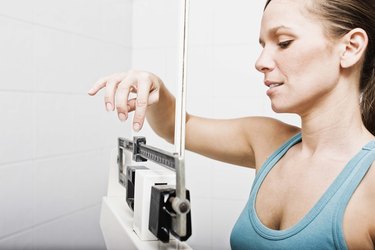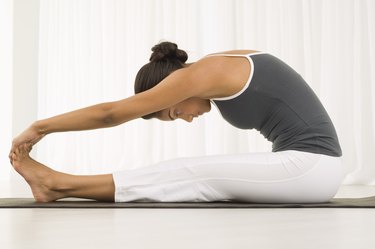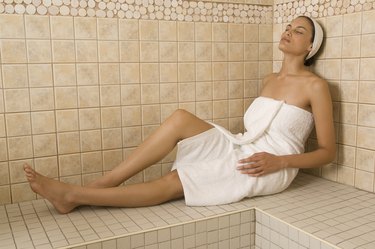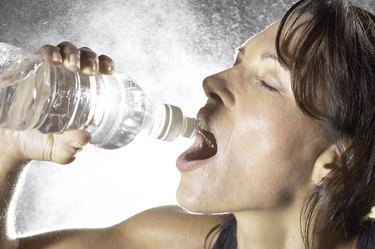
Despite what many marketers say, heat does not increase weight loss in the long term. There may be a short-term loss, but it's in the form of water weight, not fat. Heat increases your body temperature, which makes you sweat, but it won't increase the number of calories you burn. Excess heat can actually hinder your workout by causing dehydration.
Water Weight
Video of the Day

When heat raises the temperature of your body to a high enough level, your body reacts by sweating to cool the temperature of the skin. This releases fluids from the body, primarily in the form of water and electrolytes. Any weight you lose this way will be gained back as soon as you eat or drink enough, according to Stew Smith of Military.com. This is true whether you are in a sauna, wearing a sauna suit or exercising in high temperatures. Heat won't increase the number of calories burned, which is the only thing that will lead to the loss of fat.
Video of the Day
Benefits

Heat does offer some benefits during a workout when care and caution are used. For instance, when you do Bikram yoga, a form of yoga practiced in a heated room, the heat warms the muscles and can help avoid injury by improving flexibility. Sitting in a sauna is relaxing and can help reduce stress as well as soothe sore muscles. A steam room can help unclog nasal passages and promote better breathing. When the body temperature rises, the heartbeat increases, which burns a few more calories that if the temperature were lower.
Risks

The risks involved with exercising in a hot environment or in a sauna or steam bath are many, not the least of which is dehydration. When the body gets dehydrated from losing too many fluids and electrolytes, the result can be dizziness, vomiting, muscle cramps, nausea, fainting, and eventually heat exhaustion or heatstroke. Severe dehydration can damage the kidneys and even lead to death. People over 65, children, and people with high blood pressure are more at risk when exposed to extreme heat.
Recommendations

The most important thing when you are exposed to increased heat, whether through exercising in warmer weather or sitting in the sauna, is to remain hydrated. Drink plenty of water before, during and after an activity causes sweating. Consuming sports drinks with added electrolytes after exercising can help. Avoid sitting in a sauna for too long -- less than 20 minutes is best. Also avoid using sauna suits or plastic suits; they won't increase the number of calories you expend and can easily lead to dehydration. Avoid exercising in the heat; exercise in the early morning or evening, when it's cooler, or use an indoor facility such as a gym. Cease any activity if you start to feel weak, dizzy or nauseous or if you feel like you are going to faint.
- National Council on Strength and Fitness: Is Bikram Yoga Effective for Weight Loss?
- Military.com: Weight Loss Myths
- Texas Heart Institute: Hot Weather Exercise Tips
- ThatsFit.com: Fit or Fiction -- Does Exercising In Hot Weather Burn More Calories?
- University of Alabama at Birmingham: Saunas and Steam Baths -- Facts and Myths